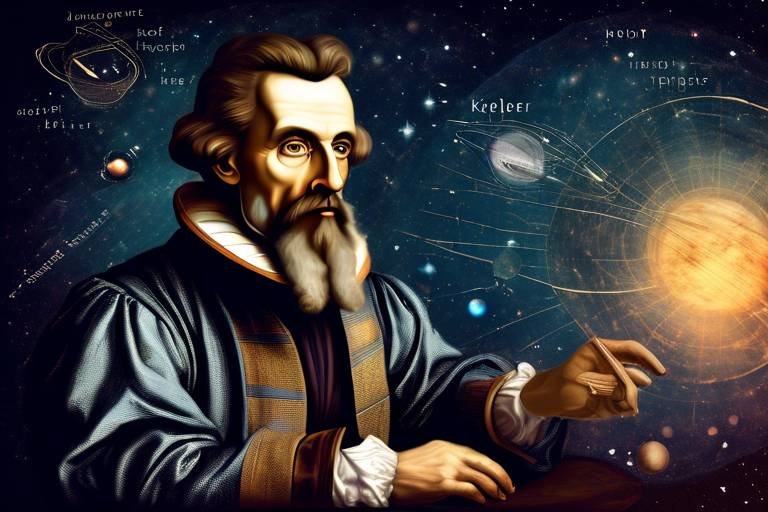The Discoveries of Florence Nightingale in Nursing
Florence Nightingale is a name that resonates deeply within the corridors of healthcare, echoing the transformative power of compassion and innovation. Often hailed as the founder of modern nursing, her contributions extend far beyond mere caregiving; they represent a profound shift in how society perceives health and wellness. Nightingale's journey began in a privileged family, yet she chose a path that would challenge societal norms and redefine a profession. Her dedication to nursing was not just about tending to the sick; it was about establishing standards of care that would save lives and enhance the dignity of the profession.
In her early years, Nightingale was influenced by her family's travels and the intellectual environment they fostered. She was a woman ahead of her time, believing fervently that nursing could be a respected profession for women. Her vision was clear: nursing should be grounded in education, ethics, and a commitment to patient care. This was no small feat in the 19th century, a time when women were often relegated to domestic roles. Nightingale's resolve to pursue nursing was akin to a revolutionary act, and it paved the way for future generations of nurses to follow in her footsteps.
As we delve deeper into her life, it's essential to recognize the pivotal moment that would catapult Nightingale into the public eye: the Crimean War. This conflict was not just a backdrop for her work; it was a catalyst that showcased her skills and determination. Nightingale arrived in Scutari, Turkey, where British soldiers were suffering from appalling conditions. With her keen eye for detail and unwavering commitment to health, she implemented sanitary reforms that drastically reduced the mortality rates among soldiers. Her efforts were nothing short of miraculous, and her ability to lead in such dire circumstances established her as a formidable figure in healthcare reform.
But Nightingale's impact didn't stop at improving conditions on the battlefield. She was a pioneer in utilizing statistical analysis to advocate for health reforms. By meticulously collecting and analyzing data, she was able to illustrate the stark realities of healthcare inadequacies. Her use of statistics was revolutionary; it transformed the way healthcare providers viewed patient care. Nightingale’s findings emphasized the need for improved hospital conditions and patient care, and her methods laid the groundwork for evidence-based practices in nursing.
One of her most notable contributions to data visualization was the creation of the coxcomb diagram. This unique representation of data not only showcased mortality rates but also effectively communicated the urgent need for healthcare improvements to policymakers. Imagine a pie chart, but with a twist—each segment representing a different aspect of health, visually demonstrating the impact of sanitary conditions on soldier mortality. This innovative approach to data visualization was a game-changer, providing a clear and compelling argument for reform.
Nightingale's tireless advocacy did not go unnoticed. Her statistical findings influenced public health policies, leading to significant reforms in both military and civilian healthcare systems. It was her work that prompted governments to take a closer look at healthcare standards and implement changes that would save countless lives. The ripple effect of her contributions can still be felt today, as many of the principles she championed continue to guide modern nursing practices.
In addition to her groundbreaking work in healthcare reform, Nightingale understood the importance of education and training for nurses. She established the first formal nursing school, emphasizing that nursing was not just a vocation but a profession that required rigorous training and ethical standards. Her curriculum was designed to equip nurses with the knowledge and skills they needed to provide high-quality care, ensuring that they could uphold the values she so passionately advocated for.
Florence Nightingale's legacy is a testament to the power of one individual's vision to transform an entire profession. Her influence extends beyond her lifetime, shaping nursing education, healthcare policy, and the ethical standards that guide nursing practice today. The Nightingale Pledge, created to uphold ethical standards in nursing, continues to inspire nurses around the world to commit to the highest level of care and compassion.
Moreover, the celebration of International Nurses Day on Nightingale's birthday serves as a reminder of the vital role nurses play in our healthcare systems. This day not only honors her contributions but also recognizes the hard work and dedication of nurses everywhere. It's a moment for reflection, celebration, and a call to action to continue advocating for the profession and the patients they serve.
- What inspired Florence Nightingale to become a nurse?
Nightingale was inspired by her belief that nursing could be a respected profession for women and her desire to improve healthcare standards. - How did Nightingale impact the Crimean War?
Her efforts to improve sanitary conditions in military hospitals drastically reduced mortality rates among soldiers. - What is the Nightingale Pledge?
The Nightingale Pledge is an ethical code for nurses, created to uphold the standards of nursing practice and patient care. - Why is International Nurses Day celebrated?
It is celebrated on Nightingale's birthday to honor the contributions of nurses worldwide and promote the nursing profession.

The Birth of Modern Nursing
Florence Nightingale is often regarded as the founder of modern nursing, a title she earned through her relentless pursuit of healthcare reform and her innovative approach to patient care. Born on May 12, 1820, in Florence, Italy, Nightingale was a woman ahead of her time. Growing up in a wealthy British family, she was expected to conform to societal norms, which dictated that women should marry and manage a household. However, Florence felt a calling to serve others, particularly in the field of healthcare. This desire led her to defy conventional expectations and embark on a journey that would change the face of nursing forever.
Her early experiences, such as visiting hospitals and observing the conditions of the sick, played a crucial role in shaping her vision. Nightingale's compassion for the suffering and her keen observational skills allowed her to recognize the dire need for reform in nursing practices. She believed that nursing should be a respected profession, grounded in education and ethical standards. This belief was revolutionary, as the role of a nurse at that time was often relegated to that of a caretaker, with little emphasis on formal training or professional recognition.
In her quest to establish nursing as a legitimate profession, Nightingale took it upon herself to educate and train others. She understood that knowledge was power, and she sought to create a structured curriculum that would equip nurses with the skills and knowledge necessary to provide quality care. This dedication to education culminated in the founding of the Nightingale School of Nursing at St. Thomas' Hospital in London in 1860, which became the first secular nursing school in the world. The school's curriculum emphasized not only clinical skills but also the importance of hygiene, sanitation, and compassionate care.
Florence Nightingale's approach to nursing was groundbreaking. She introduced a set of principles that emphasized the importance of a clean and safe environment for patient care. Her focus on sanitation, nutrition, and the psychological well-being of patients laid the groundwork for modern nursing practices. Nightingale famously said, "The very first requirement in a hospital is that it should do the sick no harm." This simple yet profound statement encapsulates her vision for nursing as a profession dedicated to the welfare of patients.
As Nightingale's influence grew, so did her recognition as a leader in healthcare reform. Her innovative methods and dedication to improving patient care not only transformed nursing but also inspired a generation of women to pursue careers in healthcare. The legacy of her work is evident today, as nursing continues to evolve into a respected and essential profession within the healthcare system.
In summary, the birth of modern nursing can be traced back to Florence Nightingale's unwavering commitment to healthcare reform and her pioneering efforts to establish nursing as a respected profession. Her contributions laid the foundation for a movement that would empower countless individuals to enter the field of nursing, ensuring that quality care remains at the forefront of healthcare practices.

The Crimean War and Its Impact
Florence Nightingale's contributions during the Crimean War were nothing short of revolutionary. When the war broke out in 1853, the British military faced a shocking reality: the conditions in the hospitals were appalling, and the mortality rates among soldiers were alarmingly high. Nightingale, driven by her passion for nursing and her commitment to improving healthcare, took it upon herself to make a difference. She led a group of 38 nurses to the front lines, where they encountered not only the horrors of war but also the dire need for sanitary practices.
Upon her arrival at the Barrack Hospital in Scutari, Nightingale was horrified by the conditions. Soldiers were suffering from preventable diseases due to unsanitary conditions, inadequate nutrition, and lack of proper medical care. With a keen eye for detail, she immediately set to work, implementing stringent hygiene protocols. She understood that cleanliness was not just a luxury but a necessity for survival. Nightingale's efforts included:
- Improving ventilation in the wards
- Ensuring proper sanitation and waste disposal
- Providing adequate nutrition for the patients
- Establishing a system for patient care and record-keeping
Her tireless work led to a drastic reduction in the hospital's mortality rate, which fell from an astonishing 42% to just 2% within six months. This remarkable achievement not only saved countless lives but also established Nightingale as a formidable leader in healthcare reform. Her ability to combine compassion with practical solutions set a new standard for nursing and healthcare practices.
Moreover, Nightingale's experiences during the Crimean War underscored the importance of data collection in healthcare. She meticulously recorded statistics on patient outcomes, which would later serve as a foundation for her advocacy for health reforms. Nightingale's approach to nursing was not merely about caring for the sick; it was about understanding the underlying factors that contributed to health and illness.
In addition to her immediate impact, Nightingale's work during the Crimean War had far-reaching implications for public health policy. Her findings prompted military and civilian authorities to reconsider the organization and management of healthcare services. The British government, influenced by her reports, initiated significant reforms, leading to the establishment of better sanitary conditions in military hospitals and eventually in civilian healthcare systems.
As we reflect on Nightingale's legacy, it's clear that her time during the Crimean War was a catalyst for change. She transformed nursing from a largely unregulated profession into a respected field, paving the way for future generations of nurses. Her insights into the relationship between environment and health remain relevant today, reminding us that good healthcare practices are essential for saving lives.
Q1: What was Florence Nightingale's role in the Crimean War?
A1: Florence Nightingale served as a nurse during the Crimean War, where she implemented sanitary practices that significantly reduced the mortality rate among soldiers in hospitals.
Q2: How did Nightingale's work impact healthcare policies?
A2: Her efforts and statistical findings led to substantial reforms in military and civilian healthcare systems, emphasizing the need for improved sanitary conditions and patient care.
Q3: What are some key practices Nightingale introduced during the war?
A3: Nightingale improved ventilation, sanitation, nutrition, and record-keeping in hospitals, which were crucial in reducing the spread of disease.

Florence Nightingale was not just a nurse; she was a visionary who transformed the way healthcare was perceived and delivered. Her innovative approach to statistical analysis was groundbreaking, especially at a time when data was often overlooked in favor of anecdotal evidence. Nightingale understood that numbers could tell a compelling story, and she wielded them like a skilled artist with a brush, painting a picture that highlighted the urgent need for reform in healthcare practices.
During her time in the Crimean War, Nightingale meticulously collected data on the health conditions of soldiers. She recorded everything from the number of patients to the causes of death, and she did so with an unwavering commitment to accuracy. This wasn't just about crunching numbers; it was about saving lives. By analyzing this data, she discovered that poor sanitary conditions were a leading factor in the high mortality rates among soldiers. This revelation was not just a statistic; it was a clarion call for change.
Nightingale's use of statistics was revolutionary because it shifted the focus from mere observation to a scientific approach to healthcare. She believed that healthcare should be based on evidence, and her findings laid the groundwork for modern epidemiology. For instance, she famously created the polar area diagram, which is now often referred to as the coxcomb diagram. This innovative visual tool allowed her to present complex data in a way that was easy to understand, even for those who were not statistically inclined.
| Data Type | Description | Impact |
|---|---|---|
| Mortality Rates | Statistics showing the number of deaths among soldiers due to unsanitary conditions. | Led to immediate reforms in hospital sanitation and care. |
| Patient Recovery Times | Data on how long it took patients to recover based on different sanitary practices. | Demonstrated the importance of cleanliness in patient care. |
By presenting her findings in such an impactful way, Nightingale was able to influence military and civilian healthcare policies significantly. Her work didn't just lead to changes in hospitals; it sparked a broader conversation about public health and the importance of data-driven decision-making. Nightingale's commitment to using statistics as a tool for advocacy established a precedent that is still relevant today. In a world where data is often seen as overwhelming, she showed us that it could be a powerful ally in the quest for better health outcomes.
In summary, Florence Nightingale's pioneering use of statistical analysis not only revolutionized nursing practices but also laid the foundation for a more scientific approach to healthcare. Her ability to translate complex data into actionable insights has left a lasting legacy, reminding us that behind every number is a human life that deserves care and attention.
- What was Florence Nightingale's primary contribution to nursing? Nightingale is credited with founding modern nursing and emphasizing the importance of sanitation and statistical analysis in healthcare.
- How did Nightingale use statistics to improve healthcare? She collected and analyzed data on patient outcomes, which led to significant reforms in hospital sanitation and patient care practices.
- What is the Nightingale Pledge? The Nightingale Pledge is an ethical code for nurses, created to uphold the standards of the nursing profession.

Florence Nightingale was not just a nurse; she was a visionary who understood the power of data visualization long before it became a buzzword in today's tech-driven world. Imagine being able to take a mountain of complex statistics and transform it into a vivid, easily digestible format that not only informs but also persuades. That's exactly what Nightingale did with her innovative coxcomb diagrams.
These diagrams were a game-changer. They allowed her to present the overwhelming evidence of the appalling sanitary conditions in military hospitals during the Crimean War in a way that was impossible to ignore. Instead of drowning policymakers in numbers and percentages, she created a visual representation that told a story—a story of suffering, death, and the urgent need for reform. Each segment of the coxcomb diagram represented a different cause of mortality, making it clear at a glance how many lives could be saved with improved sanitation and care.
To further illustrate Nightingale's impact, let's take a look at a simplified version of her coxcomb diagram:
| Cause of Death | Number of Deaths | Percentage |
|---|---|---|
| Disease | 4,000 | 60% |
| Wounds | 2,000 | 30% |
| Other Causes | 1,000 | 10% |
This table is a simplified representation of how Nightingale categorized mortality causes. The coxcomb diagram would have visually displayed these figures, with each section of the diagram proportionate to the number of deaths attributed to each cause. By visualizing data in this way, she captured the attention of military officials and the public alike, compelling them to take action.
Moreover, Nightingale's approach to data visualization was revolutionary not just for her time but even for today’s standards. She demonstrated that effective communication is key in healthcare. The ability to convert raw data into a compelling narrative is a skill that's just as important now as it was in the 19th century. Her work paved the way for future healthcare professionals to utilize statistics and graphics to advocate for change, making her contributions to the field of nursing not just about patient care but also about the importance of informed decision-making.
In summary, Florence Nightingale's pioneering methods of data visualization not only highlighted critical issues in healthcare but also established a framework for future reforms. Her coxcomb diagrams remain a testament to the idea that seeing is believing, and they continue to inspire healthcare professionals to present data in ways that make a difference.
- What is a coxcomb diagram? A coxcomb diagram is a type of data visualization created by Florence Nightingale that uses a circular format to display statistical data, particularly to represent causes of mortality in a visually impactful way.
- How did Nightingale's work influence modern nursing? Nightingale's emphasis on sanitation, data analysis, and education laid the groundwork for nursing as a respected profession, leading to significant reforms in healthcare practices and policies.
- Why is visualization of data important in healthcare? Visualization of data helps to simplify complex information, making it easier for stakeholders to understand critical issues and make informed decisions that can lead to improved patient outcomes.

coxcomb diagrams.
This article explores the groundbreaking contributions of Florence Nightingale to the field of nursing, highlighting her innovative practices, statistical analysis, and the lasting impact she made on healthcare.
Florence Nightingale is often regarded as the founder of modern nursing. This section discusses her early life and the experiences that shaped her vision for nursing as a respected profession.
Nightingale's work during the Crimean War was pivotal. Here, we examine how her efforts to improve sanitary conditions drastically reduced mortality rates among soldiers and established her as a leader in healthcare reform.
Nightingale was a pioneer in using statistics to advocate for health reforms. This section delves into her innovative use of data to highlight the need for improved hospital conditions and patient care.
Nightingale developed unique visual representations of data, known as coxcomb diagrams. These diagrams were not just pretty pictures; they were powerful tools that transformed complex data into clear, actionable insights. Imagine trying to convey a dire message about health conditions without a voice—this is where her diagrams came into play. By using a combination of circular graphs and color coding, Nightingale was able to illustrate the causes of mortality in the military hospitals she was working to reform.
The coxcomb diagram's design allowed her to show the proportion of deaths due to various causes, such as disease, wounds, and other factors. This visual representation was revolutionary because it made the data accessible to those who may not have been familiar with statistics. Policymakers and military leaders could now see at a glance how many soldiers were dying from preventable diseases compared to those who were injured in battle. The impact was profound, as it not only highlighted the urgent need for sanitary reforms but also provided a compelling argument for change.
To give you a better idea of how these diagrams worked, here’s a simplified breakdown:
| Cause of Death | Percentage of Total Deaths |
|---|---|
| Disease | 62% |
| Wounds | 24% |
| Other Causes | 14% |
Through her innovative approach, Nightingale not only made statistics more understandable but also influenced the way data was used in healthcare. Her coxcomb diagrams became a standard for visualizing health data, paving the way for future generations of healthcare professionals to advocate for necessary reforms with clarity and precision.
Her statistical findings influenced public health policies. This part discusses how Nightingale's work led to significant reforms in military and civilian healthcare systems.
Nightingale established the first formal nursing school, emphasizing the importance of education in nursing. This section covers her curriculum and the principles that guided her training methods.
Nightingale's influence extends beyond her lifetime. This section reflects on her lasting legacy in nursing education, healthcare policy, and the ongoing relevance of her principles in modern nursing practice.
The Nightingale Pledge was created to uphold ethical standards in nursing. This subsection discusses its significance and how it continues to inspire nursing ethics today.
International Nurses Day is celebrated on Nightingale's birthday. This part highlights the importance of this day in recognizing the contributions of nurses worldwide and promoting the nursing profession.
- What are coxcomb diagrams?
Coxcomb diagrams are a type of circular graph developed by Florence Nightingale to visually represent statistical data, particularly to highlight causes of mortality in hospitals. - How did Nightingale use statistics in her work?
Nightingale utilized statistics to advocate for health reforms, illustrating the need for improved sanitary conditions in hospitals through clear visual data representations. - What is the significance of the Nightingale Pledge?
The Nightingale Pledge is an ethical code for nurses, emphasizing the commitment to patient care and professional integrity, inspired by Nightingale's principles.

This subsection explores how these visuals effectively communicated the dire need for healthcare improvements to policymakers.
This article explores the groundbreaking contributions of Florence Nightingale to the field of nursing, highlighting her innovative practices, statistical analysis, and the lasting impact she made on healthcare.
Florence Nightingale is often regarded as the founder of modern nursing. This section discusses her early life and the experiences that shaped her vision for nursing as a respected profession.
Nightingale's work during the Crimean War was pivotal. Here, we examine how her efforts to improve sanitary conditions drastically reduced mortality rates among soldiers and established her as a leader in healthcare reform.
Nightingale was a pioneer in using statistics to advocate for health reforms. This section delves into her innovative use of data to highlight the need for improved hospital conditions and patient care.
Nightingale developed unique visual representations of data, known as coxcomb diagrams. These visuals were not just pretty pictures; they were powerful tools that effectively communicated the dire need for healthcare improvements to policymakers. Imagine trying to explain a complex issue without visuals—it would be like trying to sell ice to an Eskimo without showing them the product! Nightingale understood that a picture is worth a thousand words, and she harnessed this idea to advocate for urgent reforms.
Her coxcomb diagrams illustrated the stark reality of soldier mortality due to unsanitary conditions. By using different colors and sections, she visually represented the causes of death, making it clear that most deaths were preventable. Policymakers, who might have been indifferent to mere statistics, were suddenly faced with a compelling visual narrative that demanded action. This innovative approach not only captured attention but also sparked conversations that led to significant healthcare reforms.
To further emphasize the impact of her visuals, consider the following table that outlines the key elements of her coxcomb diagrams:
| Element | Description |
|---|---|
| Color Coding | Used to differentiate causes of mortality, making data easily understandable. |
| Proportional Representation | Each segment represented a specific cause, showing the scale of preventable deaths. |
| Clear Labels | Labels provided context and clarity, ensuring the audience understood the urgency. |
Through her innovative data visualization techniques, Nightingale was able to transform complex healthcare data into actionable insights. This not only informed policymakers but also engaged the public, raising awareness about the conditions in military hospitals. Her ability to translate data into a visual format was revolutionary, setting a precedent for future healthcare advocacy efforts.
Her statistical findings influenced public health policies. This part discusses how Nightingale's work led to significant reforms in military and civilian healthcare systems.
Nightingale established the first formal nursing school, emphasizing the importance of education in nursing. This section covers her curriculum and the principles that guided her training methods.
Nightingale's influence extends beyond her lifetime. This section reflects on her lasting legacy in nursing education, healthcare policy, and the ongoing relevance of her principles in modern nursing practice.
The Nightingale Pledge was created to uphold ethical standards in nursing. This subsection discusses its significance and how it continues to inspire nursing ethics today.
International Nurses Day is celebrated on Nightingale's birthday. This part highlights the importance of this day in recognizing the contributions of nurses worldwide and promoting the nursing profession.
- What is the significance of Florence Nightingale in nursing?
Florence Nightingale is known as the founder of modern nursing due to her pioneering work in healthcare reform and the establishment of nursing as a respected profession.
- How did Nightingale use statistics in her work?
Nightingale utilized statistical analysis to highlight the need for healthcare improvements, employing innovative data visualization techniques to advocate for change.
- What is the Nightingale Pledge?
The Nightingale Pledge is an oath taken by nurses to uphold ethical standards in their practice, inspired by Nightingale's commitment to patient care.
- Why is International Nurses Day celebrated?
International Nurses Day, celebrated on Nightingale's birthday, honors the contributions of nurses and promotes the nursing profession globally.

Florence Nightingale's contributions to nursing were not just about improving patient care; they also had a profound and lasting impact on public health policy. Her meticulous statistical analysis during the Crimean War provided undeniable evidence of the dire conditions faced by soldiers, which in turn sparked significant reforms across military and civilian healthcare systems. Imagine a world where data was merely a collection of numbers—Nightingale transformed that perception by using statistics as a powerful tool to advocate for change, making her one of the first to recognize that numbers could tell a story about human suffering and the urgent need for reform.
Through her work, Nightingale was able to highlight the critical relationship between sanitation and health. She meticulously documented the unsanitary conditions in military hospitals, revealing that poor hygiene practices were leading to alarmingly high mortality rates. Her findings were not just limited to the battlefield; they resonated throughout society, influencing public health policies in various sectors. Policymakers could no longer ignore the evidence she presented, which ultimately led to the establishment of more rigorous health standards.
One of the most significant outcomes of Nightingale's advocacy was the introduction of the Royal Commission on the Health of the Army in 1857. This commission was a direct response to her findings and resulted in sweeping reforms, including:
- Improved sanitation practices in military hospitals.
- Better living conditions for soldiers.
- Increased funding for healthcare facilities.
Moreover, Nightingale's influence extended beyond the military. Her work laid the groundwork for public health reforms in civilian life as well. She championed the importance of clean water, proper waste disposal, and the need for trained healthcare professionals. Thanks to her efforts, cities began to adopt better sanitation practices, and the concept of public health emerged as a fundamental aspect of governance. Nightingale's legacy is evident in today's public health policies, which continue to prioritize hygiene and preventive care as essential components of health systems worldwide.
In summary, Florence Nightingale's impact on public health policy was revolutionary. She not only transformed nursing into a respected profession but also fundamentally changed how society approached health and sanitation. By using data to advocate for change, she set a precedent for future healthcare reforms and established a model for how evidence-based practices could lead to improved health outcomes. Her legacy endures, reminding us that the intersection of statistics and compassion can lead to monumental changes in public health.
- What was Florence Nightingale's main contribution to nursing?
Nightingale is best known for establishing nursing as a respected profession and for her pioneering work in sanitation and healthcare reform during the Crimean War. - How did Nightingale use statistics in her work?
She employed statistical analysis to highlight the need for improved sanitation in hospitals, using her findings to advocate for significant reforms. - What is the Nightingale Pledge?
The Nightingale Pledge is an ethical code for nurses, created to uphold the standards of the profession and ensure patient care is delivered with integrity. - Why is International Nurses Day celebrated?
International Nurses Day is celebrated on May 12, Florence Nightingale's birthday, to honor the contributions of nurses worldwide and to promote the nursing profession.

Florence Nightingale revolutionized the field of nursing not just through her groundbreaking practices but also by establishing a robust framework for nursing education. She recognized early on that a well-trained nurse was essential for improving patient care. In 1860, she founded the Nightingale School of Nursing at St. Thomas' Hospital in London, which was the first formal nursing school in the world. This institution was not just about teaching the basics of nursing; it was about creating a new standard for the profession. Nightingale believed that education should encompass both theoretical knowledge and practical skills, ensuring that nurses were fully equipped to handle the complexities of patient care.
Nightingale's curriculum was comprehensive and innovative, focusing on various aspects of healthcare. The program included subjects such as anatomy, physiology, hygiene, and ethics. Moreover, it emphasized the importance of hands-on training, where students could practice their skills in real-life settings. This blend of theory and practice was crucial in shaping competent nurses who could provide high-quality care. Nightingale also understood that education was not a one-time event; rather, it was a continuous process. She encouraged her students to engage in lifelong learning, adapting to the ever-evolving healthcare landscape.
One of the key principles that guided Nightingale's training methods was the idea of compassionate care. She firmly believed that nursing was not just a job; it was a calling. Nurses needed to approach their work with empathy and dedication, understanding the emotional and psychological needs of their patients. This philosophy was embedded in the training program, fostering a sense of duty and responsibility among nursing students. Nightingale's emphasis on ethics in nursing education laid the groundwork for what we now consider the ethical standards of the profession.
In addition to her formal training program, Nightingale also advocated for the professionalization of nursing. She pushed for recognition of nursing as a legitimate career path, encouraging women to pursue this noble profession. By establishing a structured educational system, she not only elevated the status of nurses but also ensured that they were respected members of the healthcare team. This shift in perception was vital in attracting more individuals to the field, leading to a more skilled and dedicated workforce.
The impact of Nightingale’s educational reforms can still be felt today. Modern nursing programs continue to build upon her foundational principles, emphasizing the importance of both academic knowledge and practical experience. Many nursing schools around the world have adopted her model, ensuring that future generations of nurses are well-prepared to meet the challenges of healthcare. As we celebrate the legacy of Florence Nightingale, it’s essential to recognize her profound influence on nursing education and the lasting standards she set for the profession.
- What was Florence Nightingale's contribution to nursing education?
Nightingale established the first formal nursing school, emphasizing a structured curriculum that combined theoretical knowledge with practical experience.
- Why is the Nightingale Pledge significant?
The Nightingale Pledge was created to uphold ethical standards in nursing, inspiring generations of nurses to commit to compassionate care.
- How did Nightingale's work influence modern nursing?
Nightingale's emphasis on education, ethics, and statistical analysis laid the groundwork for contemporary nursing practices and healthcare reforms.

Florence Nightingale's influence extends far beyond her lifetime, echoing through the corridors of modern healthcare and nursing education. Her pioneering spirit and unwavering commitment to improving patient care have left an indelible mark on the profession. Nightingale's legacy is not just about the reforms she implemented; it’s about the enduring principles she established that continue to guide nurses today. She transformed nursing into a respected profession, emphasizing the need for trained professionals who could provide compassionate and competent care.
One of the most significant aspects of Nightingale's legacy is her emphasis on education. She understood that knowledge was power, and thus, she founded the first formal nursing school at St. Thomas' Hospital in London in 1860. This institution became a model for nursing schools around the world, teaching not only practical skills but also the importance of hygiene, patient observation, and the psychological aspects of care. Her curriculum was revolutionary, incorporating both theoretical and practical components that educated nurses to be critical thinkers and compassionate caregivers.
Moreover, Nightingale's commitment to ethical standards in nursing is encapsulated in the Nightingale Pledge, which was introduced in 1893. This pledge serves as an ethical guide for nurses, emphasizing their duty to provide care with integrity and compassion. It is a reminder of the responsibility nurses have towards their patients and the community. The principles outlined in the pledge continue to inspire nursing ethics today, ensuring that new generations of nurses uphold the values of respect, dignity, and care.
In addition to her contributions to education and ethics, Nightingale's work significantly influenced public health policy. Her statistical analyses and reports on the conditions of hospitals during the Crimean War brought about substantial reforms in military and civilian healthcare systems. The changes she advocated for included improved sanitation, better nutrition for patients, and the establishment of nursing as a vital component of healthcare. These reforms not only saved lives during her time but also laid the groundwork for future public health initiatives.
To illustrate the impact of Nightingale’s work, consider the following table that summarizes key contributions and their effects:
| Contribution | Impact |
|---|---|
| Founded the first nursing school | Established formal education in nursing |
| Developed the Nightingale Pledge | Set ethical standards for nursing practice |
| Applied statistical analysis to healthcare | Influenced public health policies and reforms |
Today, Nightingale's legacy is celebrated annually on International Nurses Day, which falls on her birthday, May 12. This day serves as a reminder of the vital role nurses play in healthcare systems worldwide. It’s a time to reflect on the contributions of nurses, to promote the profession, and to recognize the ongoing challenges they face. The day also highlights the importance of continuous education and advocacy for better working conditions, echoing Nightingale's lifelong dedication to nursing.
In conclusion, Florence Nightingale's legacy is a beacon of inspiration for nurses and healthcare professionals around the globe. Her innovative practices, commitment to education, and ethical standards have shaped the nursing profession into what it is today. As we honor her contributions, we must also strive to continue her work, ensuring that the principles she championed remain at the forefront of nursing practice.
- What did Florence Nightingale do during the Crimean War?
She improved sanitary conditions in military hospitals, which significantly reduced mortality rates among soldiers. - Why is the Nightingale Pledge important?
It sets ethical standards for nurses, emphasizing their commitment to providing compassionate and competent care. - How did Nightingale influence nursing education?
She founded the first formal nursing school, establishing a curriculum that combined theory with practical skills.

The Nightingale Pledge is more than just a ceremonial commitment; it embodies the core ethical standards that every nurse should aspire to uphold. Established in 1893, this pledge serves as a guiding principle for nurses around the world, emphasizing the importance of compassion, integrity, and professionalism in healthcare. Just as Florence Nightingale herself dedicated her life to improving the standards of nursing, the pledge encourages nurses to commit to the highest ethical standards in their practice.
At its heart, the Nightingale Pledge is a promise to prioritize patient care above all else. It encourages nurses to treat every patient with dignity and respect, acknowledging their unique needs and circumstances. This commitment is crucial in fostering a trusting relationship between nurses and patients, which is essential for effective healthcare delivery. The pledge also highlights the importance of continuous learning and self-improvement, reminding nurses that their education is an ongoing journey.
In a world where healthcare is constantly evolving, the ethical standards outlined in the Nightingale Pledge remain remarkably relevant. They serve as a reminder that nurses are not just caregivers but also advocates for their patients. By adhering to these principles, nurses can ensure that they provide the best possible care while also promoting health equity and social justice.
To illustrate the key components of the Nightingale Pledge, we can break it down into several core principles:
- Compassionate Care: Nurses pledge to provide care with empathy and understanding.
- Respect for Patients: Every individual deserves respect and dignity, regardless of their background.
- Commitment to Learning: Nurses are encouraged to engage in lifelong learning to enhance their skills and knowledge.
- Advocacy: Nurses must advocate for the health and rights of their patients.
The Nightingale Pledge not only serves as a personal commitment for nurses but also as a collective standard that unites the nursing profession globally. It reminds us that nursing is not just a job; it is a vocation that requires dedication, ethical behavior, and a relentless pursuit of excellence. As we celebrate the contributions of Florence Nightingale, let us also recognize the importance of this pledge in shaping the future of nursing.
| Question | Answer |
|---|---|
| What is the Nightingale Pledge? | The Nightingale Pledge is a commitment made by nurses to uphold ethical standards and provide compassionate care to their patients. |
| When was the Nightingale Pledge established? | The pledge was established in 1893 and has been a guiding principle for nurses ever since. |
| Why is the Nightingale Pledge important? | It emphasizes the ethical responsibilities of nurses and promotes a standard of care that prioritizes the well-being of patients. |
| How does the Nightingale Pledge influence modern nursing? | It serves as a foundation for ethical nursing practice, inspiring nurses to advocate for their patients and engage in lifelong learning. |

International Nurses Day, celebrated every year on May 12th, is not just a date on the calendar; it’s a heartfelt tribute to the incredible contributions of nurses around the globe. This day marks the birthday of Florence Nightingale, the pioneer of modern nursing, and serves as a reminder of the vital role nurses play in healthcare. Imagine a world without nurses—who would be there to provide care, comfort, and compassion to patients in need? This day shines a spotlight on the unwavering dedication and hard work of nursing professionals who often go above and beyond to ensure the well-being of their patients.
On International Nurses Day, various activities and events are organized to honor nurses and raise awareness about their essential contributions. Hospitals and healthcare organizations typically host celebrations, educational seminars, and community outreach programs. These events are not only a way to recognize the hard work of nurses but also to promote the importance of nursing as a profession. For instance, many institutions take this opportunity to highlight the following:
- The significance of nursing education and training.
- The importance of mental health care for nurses themselves.
- Advocacy for better working conditions and fair compensation.
Moreover, International Nurses Day also serves as a platform to discuss the challenges nurses face, including staffing shortages, workplace violence, and mental health issues. By bringing these issues to light, we can foster a greater understanding of the need for systemic changes within the healthcare system. Just like Florence Nightingale used her voice and statistics to advocate for healthcare reforms, today’s nurses can benefit from similar support and recognition.
As part of the celebrations, many organizations distribute materials that educate the public about the nursing profession. These resources often include statistics about the impact nurses have on patient outcomes, the importance of their role in public health, and stories that highlight the compassionate care they provide. It's a day for everyone to reflect on the profound impact nurses have on our lives, often at the most vulnerable moments.
In conclusion, International Nurses Day is more than just a day to say "thank you" to nurses; it’s a reminder of the ongoing commitment to improve the nursing profession and healthcare systems worldwide. As we celebrate this day, let’s remember to advocate for the rights and well-being of nurses, ensuring they have the resources and support they need to continue their invaluable work. After all, when we uplift nurses, we uplift the entire healthcare system!
| Question | Answer |
|---|---|
| What is the significance of International Nurses Day? | It celebrates the contributions of nurses and raises awareness about the nursing profession, honoring Florence Nightingale's legacy. |
| When is International Nurses Day celebrated? | International Nurses Day is celebrated on May 12th each year, coinciding with Florence Nightingale's birthday. |
| How can I participate in International Nurses Day? | You can participate by attending local events, sharing stories of nurses, or simply expressing gratitude to the nurses in your life. |
Frequently Asked Questions
- What were Florence Nightingale's key contributions to nursing?
Florence Nightingale is celebrated for establishing nursing as a respected profession. Her key contributions include improving sanitary conditions in hospitals, particularly during the Crimean War, and advocating for health reforms through statistical analysis. She also founded the first formal nursing school, emphasizing education and training in nursing practices.
- How did Florence Nightingale impact healthcare during the Crimean War?
During the Crimean War, Nightingale's efforts to improve hygiene and sanitary conditions in military hospitals led to a dramatic reduction in mortality rates. Her work not only saved countless lives but also highlighted the importance of proper healthcare practices, establishing her as a leader in healthcare reform.
- What role did statistics play in Nightingale's work?
Nightingale was a pioneer in using statistics to advocate for health reforms. She meticulously collected and analyzed data to demonstrate the dire need for improved hospital conditions. Her innovative use of data visualization, especially through coxcomb diagrams, made complex information accessible and compelling to policymakers.
- What is the Nightingale Pledge and why is it important?
The Nightingale Pledge is a modified version of the Hippocratic Oath for nurses, emphasizing ethical standards and commitment to patient care. It is significant because it continues to inspire and guide nursing ethics, ensuring that nurses uphold the values of compassion, integrity, and professionalism in their practice.
- How is International Nurses Day celebrated?
International Nurses Day is celebrated on May 12, Florence Nightingale's birthday. It recognizes the contributions of nurses worldwide and promotes the nursing profession. Activities may include educational events, award ceremonies, and community outreach programs that highlight the essential role of nurses in healthcare.
- What was the significance of Nightingale's nursing school?
Nightingale's nursing school, founded in 1860, was the first of its kind and set the foundation for modern nursing education. It emphasized rigorous training, ethical practice, and the importance of a well-rounded education for nurses, which helped elevate the profession and improve patient care standards.
- How did Nightingale's work influence public health policy?
Nightingale's statistical findings and advocacy for healthcare improvements significantly influenced public health policy. Her work led to reforms in both military and civilian healthcare systems, promoting better sanitation, improved hospital design, and a greater emphasis on patient care, which have had lasting effects on public health practices.


















